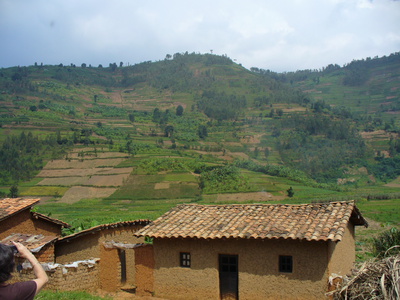
75% of Rwanda population lacks reliable energy access.
Rwanda — where 75% of citizens lack access to reliable power and rural poverty is at sky-high levels — is making ambitious green growth plans . Earlier this year, the Rwandan government announced a goal of increased electrical access to 70% by 2018. Twenty-two percent of that growth is slated for off-grid connections, which now comprise only 2% of the country’s energy sources. Rwanda has launched off-grid programs and partnerships with industry, government, and international players. Rwanda’s renewable energy goals will reduce rural poverty as citizens can power and thus grow their businesses, improve small-farm productivity, or fulfill roles in the renewable energy sector.
SOGER program goals: 77000 rural citizens powered, 7000 jobs created
Energy 4 Impact, an East African non-profit organization, is helping the government in its ambitious rural off-grid energy goals. Its Scaling up Off-Grid Energy in Rwanda (SOGER) program supports industry in delivering energy access to 77,000 of the country’s rural poor and create approximately 7,000 jobs for women and youths. The SOGER program, funded by the Swedish International Development Agency (SIDA), began in July and plans to complete its goals by June 2019. Energy 4 Impact will implement the program alongside the Ministry of Agriculture, the Rwanda Agriculture Board, and the Ministry of Local Government.
SOGER supports small, isolated mini-grid projects to provide electricity to rural communities. The program will accelerate the development and growth of remote microgrid RESP projects, including solar microgrids, the development of 30 pico-hydro micro-utilities, and solar-powered irrigation systems. The program will work with industry to support local farmers by developing the country’s solar irrigation market.
“The RESP targets isolated solar mini-grids and mini-hydro projects, as well as support to small, medium and micro-enterprises in productive use of energy,” says Energy 4 Impact country manager Herbert Nyaga. “The project seeks to create sustainable markets for solar irrigation systems to boost small-scale farming productivity in Rwanda.”
MeshPower: Solar nanogrids to light up rural homes and businesses
The Rwandan government’s support of private sector off-grid energy initiatives is making solar nanogrids a reality for rural communities. Through the national environment and climate change fund (known by its French acronym, FONERWA), the Rwanda government is able to support work by MeshPower Rwanda, a company that designs and builds solar-powered nanogrids and smart metering systems for communities that lack energy access.
A MeshPower solar nanogrid has enough capacity to provide electricity to approximately 100 homes and small businesses in a rural village. Although the village shares the nanogrid, each customer has an individual account and can use the power to meet a variety of needs. PowerMesh is working with the government to expand its services to other areas in Rwanda.
“We look forward to further collaboration” with government programs, says Joshua King, MeshPower Rwanda country manager. “We can deliver inexpensive, green, 24-hour electricity to off-grid customers all over the country, opening up economic and social opportunities that have been previously unavailable to them.”
Tesvolt: Large-scale off-grid battery storage system comes to Rwanda
A Rwandan Eastern Province agricultural project is getting some serious solar storage to support microgrid power during the area’s frequent power outages. German commercial system manufacturer Tesvolt is bringing its largest 2.68 MWh storage system to Rwanda. One-hundred-thirty-four lithium storage systems with a combined capacity of 2.68 MWh compose the array, which will connect to an IdeemaSun Energy 3.3 MW solar plant.
“In Rwanda, the power supply fails three or four times a day for between 5 and 45 minutes,” says Tesvolt director of engineering Simon Schandert. The “very powerful” Tesvolt off-grid storage system “is able to absorb electricity from the PV power plant and release it again as quickly as possible.” The system features battery management monitors on every cell so damaged cell can be identified and exchanged before they fail.
Rwanda’s renewable energy goals: A game-changer for nation
The above examples of off-grid solutions taking shape in Rwanda are encouraging signs that with adequate funding, this energy-poor African country can not only catch up but surpass other nations’ renewable energy and microgrid programs. This growth could cause significant improvements to Rwanda’s energy and economic future.
